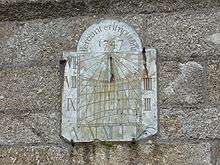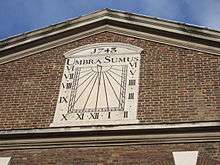List of sundial mottos
Many sundials bear a motto[lower-alpha 1] to reflect the sentiments of its maker or owner.
"Life is but a passing shadow, the shadow of a bird on the wing."
English mottos
- Be as true to each other as this dial is to the sun.
- Begone about Thy business.
- Come along and grow old with me; the best is yet to be.[1]
- Hours fly, Flowers die. New days, New ways, Pass by. Love stays.[2]
- Hours fly, Flowers bloom and die. Old days, Old ways pass. Love stays.
- I only tell of sunny hours.
- I count only sunny hours.
- Let others tell of storms and showers, I tell of sunny morning hours.
- Let others tell of storms and showers, I'll only count your sunny hours. Has date of 1767
- Life is but a shadow: the shadow of a bird on the wing.
- Self-dependent power can time defy, as rocks resist the billows and the sky.[3][4]
- Time, like an ever-rolling stream, bears all its sons away.[4][5]
- Today is Yesterday's Tomorrow[6]
- When I am gone, mark not the passing of the hours, but just that love lives on.
- The Concern of the Rich and the Poor [7]
Latin mottos
Time flies
Make use of time
- Altera pars otio, pars ista labori. (Devote this hour to work, another to leisure.)[8]
- Festina lente. (Make haste, but slowly.)[8]
- [Fugit hora] – carpe diem. ([The hour flees] – seize the day.)[8]
- Utere, non numera. (Use the hours, don't count them.)[8]
- Utere non reditura. (Use the hour, it will not come again.)[8]
Human mortality

Martial's Pereunt et Imputantur on St Buryan's parish church, Cornwall

Horace's Umbra Sumus on Brick Lane Mosque, London
- Ex iis unam cave. (Beware of one hour.)[8]
- Lente hora, celeriter anni. (An hour passes slowly, but the years go by quickly.)[8]
- Meam vide umbram, tuam videbis vitam. (Look at my shadow and you will see your life.)[8]
- Memor esto brevis ævi. (Remember how short is life.)[8]
- Mox nox. (Night, shortly.)
- [Nobis] pereunt et imputantur. ([The hours] are consumed and will be charged [to our] account)[10]
- Omnes vulnerant, ultima necat. (All hours wound; the last one kills.)[8]
- [Pulvis et] umbra sumus. (We are [dust and] shadow.)[11]
- Serius est quam cogitas. (It's later than you think.)[8]
- Sic labitur ætas. (Thus passes a lifetime.)[8]
- Sic vita fluit, dum stare videtur. (Life flows away as it seems to stay the same.)[8]
- Ultima latet ut observentur omnes. (Our last hour is hidden from us, so that we watch them all.)[8]
- Umbra sicut hominis vita. (A person's life is like a shadow.)[8]
- Una ex his erit tibi ultima. (One of these [hours] will be your last.)[8]
- Ver non semper viret. (Springtime does not last.)[8]
- Vita fugit, sicut umbra (Life passes like the shadow.)
- Vita similis umbræ. (Life resembles a shadow.)[8]
Transience
Virtue
Living
Horace's Dona præsentis cape lætus horæ ac linque severe on the Villa Vizcaya, Miami, Florida

Vita in motu on one of the sundials (right) at Houghton Hall, Norfolk, England
- Amicis qualibet hora. (Any hour for my friends.)[8]
- Dona præsentis cape lætus horæ [ac linque severe]. (Take the gifts of this hour.)[8][13]
- Fruere hora. (Enjoy the hour.)[8]
- Post tenebras spero lucem. (I hope for light to follow darkness.)[8]
- Semper amicis hora. (Always time for friends.)
- Sit fausta quæ labitur. (May the hour be favorable.)
- Sol omnibus lucet. (The sun shines for everyone.)[8]
- Tempus omnia dabit. (Time will give everything.)[8]
- Una dabit quod negat altera. (One hour will give what another has refused.)[8]
- Vita in motu. (Life is in motion.)[8]
- Vivere memento. (Remember to live.)[8]
Humorous
German mottos
- Mach' es wie die Sonnenuhr; Zähl' die heitren Stunden nur! (Do like a sundial; count only the sunny hours!)
gollark: <@319753218592866315> I am GOOD at quicksort.
gollark: never trust an message
gollark: ever trust an message
gollark: never trust an message
gollark: never trust an message
References
Notes
- The plural of motto may be either mottoes or mottos.
Footnotes
- From Robert Browning's poem Rabbi ben Ezra
- From Henry van Dyke's Inscription for Katrina's Sun-Dial
- From Oliver Goldsmith's poem The Deserted Village
- Waugh 1973, p. 124
- From Isaac Watts' hymn Our God, Our Help in Ages Past
- File:Morehead_Planetarium_Sundial.JPG
- From a sundial at Wallingtons House, Kintbury, Berkshire
- Rohr 1965, pp. 127–129
- "Tempus Fugit Velut Umbra". Archived from the original on October 15, 2013. Retrieved July 30, 2013.
- Martial, Epigrams, book V, ode xx, line 13
- Horace, Odes, Book IV, ode vii, line 16
- Ecclesiastes (Kohelet) Chapter 2, verse 11
- Horace, Odes, Book III, ode iix, line 27
- Probably unique to the William Willett memorial in Petts Wood, England, which shows British Summer Time
- Horace, Odes, Book I, ode xxxvii, line 1
Bibliography
- Earle, AM (1971). Sundials and Roses of Yesterday. Rutland, VT: Charles E. Tuttle. ISBN 0-8048-0968-2. LCCN 74142763.CS1 maint: ref=harv (link) Reprint of 1902 book published by Macmillan (New York).
- Rohr, RRJ (1996). Sundials: History, Theory, and Practice. translated by G. Godin. New York: Dover Publications. ISBN 0-486-29139-1.CS1 maint: ref=harv (link) Slightly amended reprint of the 1970 translation published by University of Toronto Press, Toronto. The original was published in 1965 as Les Cadrans solaires by Gauthier-Villars (Montrouge, France).
- Cadran Solaires. Nyons: Artissime. 1988.CS1 maint: ref=harv (link) Selections from the 1895 paper by Raphaël Blanchard in the Bulletin de la Société d'Etudes des Hautes-Alpes.
Further reading
- Boursier, C (1936). 800 Devises de cadrans solaires (in French). Paris.
- Cross, L (1915). the Book of Old Sundials. illustrated by W Hogg. London: Foulis Press.
- Gatty, Mrs Alfred; Eden, HKF; Lloyd, E (1900). The Book of Sun-Dials (4th ed.). London: George Bell & Sons.
- Hyatt, AH (1903). A Book of Sundial Mottoes. New York: Scott-Thaw.
- Landon, P (1904). Helio-tropes, or new Posies for Sundials. London: Methuen.
- Leadbetter, C (1773). Mechanick Dialling. London: Caslon.
Links
| Wikimedia Commons has media related to Sundial mottos. |
This article is issued from Wikipedia. The text is licensed under Creative Commons - Attribution - Sharealike. Additional terms may apply for the media files.